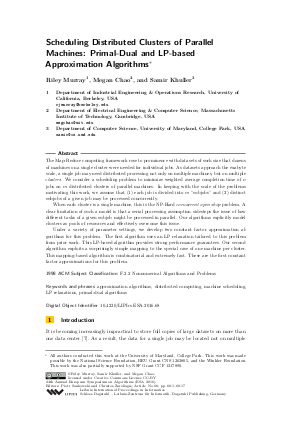Scheduling Distributed Clusters of Parallel Machines: Primal-Dual and LP-based Approximation Algorithms
Authors Riley Murray, Megan Chao, Samir Khuller
-
Part of:
Volume:
24th Annual European Symposium on Algorithms (ESA 2016)
Part of: Series: Leibniz International Proceedings in Informatics (LIPIcs)
Part of: Conference: European Symposium on Algorithms (ESA) - License:
 Creative Commons Attribution 3.0 Unported license
Creative Commons Attribution 3.0 Unported license
- Publication Date: 2016-08-18
File

PDF
LIPIcs.ESA.2016.68.pdf
- Filesize: 0.57 MB
- 17 pages
Document Identifiers
Subject Classification
Keywords
- approximation algorithms
- distributed computing
- machine scheduling
- LP relaxations
- primal-dual algorithms
Metrics
- Access Statistics
-
Total Accesses (updated on a weekly basis)
0PDF Downloads0Metadata Views
Abstract
The Map-Reduce computing framework rose to prominence with datasets of such size that dozens of machines on a single cluster were needed for individual jobs. As datasets approach the exabyte scale, a single job may need distributed processing not only on multiple machines, but on multiple clusters. We consider a scheduling problem to minimize weighted average completion time of n jobs on m distributed clusters of parallel machines. In keeping with the scale of the problems motivating this work, we assume that (1) each job is divided into m "subjobs" and (2) distinct subjobs of a given job may be processed concurrently. When each cluster is a single machine, this is the NP-Hard concurrent open shop problem. A clear limitation of such a model is that a serial processing assumption sidesteps the issue of how different tasks of a given subjob might be processed in parallel. Our algorithms explicitly model clusters as pools of resources and effectively overcome this issue. Under a variety of parameter settings, we develop two constant factor approximation algorithms for this problem. The first algorithm uses an LP relaxation tailored to this problem from prior work. This LP-based algorithm provides strong performance guarantees. Our second algorithm exploits a surprisingly simple mapping to the special case of one machine per cluster. This mapping-based algorithm is combinatorial and extremely fast. These are the first constant factor approximations for this problem.
Cite As Get BibTex
Riley Murray, Megan Chao, and Samir Khuller. Scheduling Distributed Clusters of Parallel Machines: Primal-Dual and LP-based Approximation Algorithms. In 24th Annual European Symposium on Algorithms (ESA 2016). Leibniz International Proceedings in Informatics (LIPIcs), Volume 57, pp. 68:1-68:17, Schloss Dagstuhl – Leibniz-Zentrum für Informatik (2016)
https://doi.org/10.4230/LIPIcs.ESA.2016.68
BibTex
@InProceedings{murray_et_al:LIPIcs.ESA.2016.68,
author = {Murray, Riley and Chao, Megan and Khuller, Samir},
title = {{Scheduling Distributed Clusters of Parallel Machines: Primal-Dual and LP-based Approximation Algorithms}},
booktitle = {24th Annual European Symposium on Algorithms (ESA 2016)},
pages = {68:1--68:17},
series = {Leibniz International Proceedings in Informatics (LIPIcs)},
ISBN = {978-3-95977-015-6},
ISSN = {1868-8969},
year = {2016},
volume = {57},
editor = {Sankowski, Piotr and Zaroliagis, Christos},
publisher = {Schloss Dagstuhl -- Leibniz-Zentrum f{\"u}r Informatik},
address = {Dagstuhl, Germany},
URL = {https://drops.dagstuhl.de/entities/document/10.4230/LIPIcs.ESA.2016.68},
URN = {urn:nbn:de:0030-drops-64104},
doi = {10.4230/LIPIcs.ESA.2016.68},
annote = {Keywords: approximation algorithms, distributed computing, machine scheduling, LP relaxations, primal-dual algorithms}
}
Author Details
References
- Inc Amazon Web Services. AWS Lambda - Serverless Compute, 2016 (accessed April 3, 2016). URL: https://aws.amazon.com/lambda/.
- Nikhil Bansal and Subhash Khot. Inapproximability of Hypergraph Vertex Cover and Applications to Scheduling Problems. Automata, Languages and Programming, 6198:250-261, 2010. URL: http://dx.doi.org/10.1007/978-3-642-14165-2.
- Zhi-Long Chen and Nicholas G. Hall. Supply chain scheduling: Assembly systems. Working paper., 2000. URL: http://dx.doi.org/10.1007/978-3-8349-8667-2.
- Naveen Garg, Amit Kumar, and Vinayaka Pandit. Order Scheduling Models: Hardness and Algorithms. FSTTCS 2007: Foundations of Software Technology and Theoretical Computer Science, 4855:96-107, 2007. URL: http://dx.doi.org/10.1007/978-3-540-77050-3_8.
-
Teofilo Gonzalez, Oscar Ibarra, and Sartaj Sahni. Bounds for LPT Schedules on Uniform Processors. SIAM Journal on Computing, 6(1):155-166, 1977.

-
Ronald L Graham, Eugene L Lawler, Jan Karel Lenstra, and AHG Rinnooy Kan. Optimization and approximation in deterministic sequencing and scheduling: a survey. Annals of discrete mathematics, 5:287-326, 1979.

-
Mohammad Hajjat, Shankaranarayanan P N, David Maltz, Sanjay Rao, and Kunwadee Sripanidkulchai. Dealer : Application-aware Request Splitting for Interactive Cloud Applications. CoNEXT 2012, pages 157-168, 2012.

-
Chien-Chun Hung, Leana Golubchik, and Minlan Yu. Scheduling jobs across geo-distributed datacenters. In Proceedings of the Sixth ACM Symposium on Cloud Computing, pages 111-124. ACM, 2015.

- J. Y T Leung, Haibing Li, and Michael Pinedo. Scheduling orders for multiple product types to minimize total weighted completion time. Discrete Applied Mathematics, 155(8):945-970, 2007. URL: http://dx.doi.org/10.1016/j.dam.2006.09.012.
- Monaldo Mastrolilli, Maurice Queyranne, Andreas S. Schulz, Ola Svensson, and Nelson A. Uhan. Minimizing the sum of weighted completion times in a concurrent open shop. Operations Research Letters, 38(5):390-395, 2010. URL: http://dx.doi.org/10.1016/j.orl.2010.04.011.
- Microsoft. Azure Service Fabric, 2016 (accessed April 3, 2016). URL: https://azure.microsoft.com/en-us/services/service-fabric/.
- Riley Murray, Megan Chao, and Samir Khuller. Scheduling distributed clusters of parallel machines [full version], 2016. Unpublished. URL: http://www.cs.umd.edu/users/samir/grant/ESA2016Full.pdf.
- Maurice Queyranne. Structure of a simple scheduling polyhedron. Mathematical Programming, 58(1-3):263-285, 1993. URL: http://dx.doi.org/10.1007/BF01581271.
-
Andreas S. Schulz. Polytopes and scheduling. PhD Thesis, 1996.

-
Andreas S Schulz. From linear programming relaxations to approximation algorithms for scheduling problems : A tour d'horizon. Working paper; available upon request., 2012.

-
C. Sriskandarajah and E. Wagneur. Openshops with jobs overlap. European Journal of Operations Research, 71:366-378, 1993.

- Qiang Zhang, Weiwei Wu, and Minming Li. Resource Scheduling with Supply Constraint and Linear Cost. COCOA 2012 Conference, 2012. http://arxiv.org/abs/9780201398298, URL: http://dx.doi.org/10.1007/3-540-68339-9_34.
